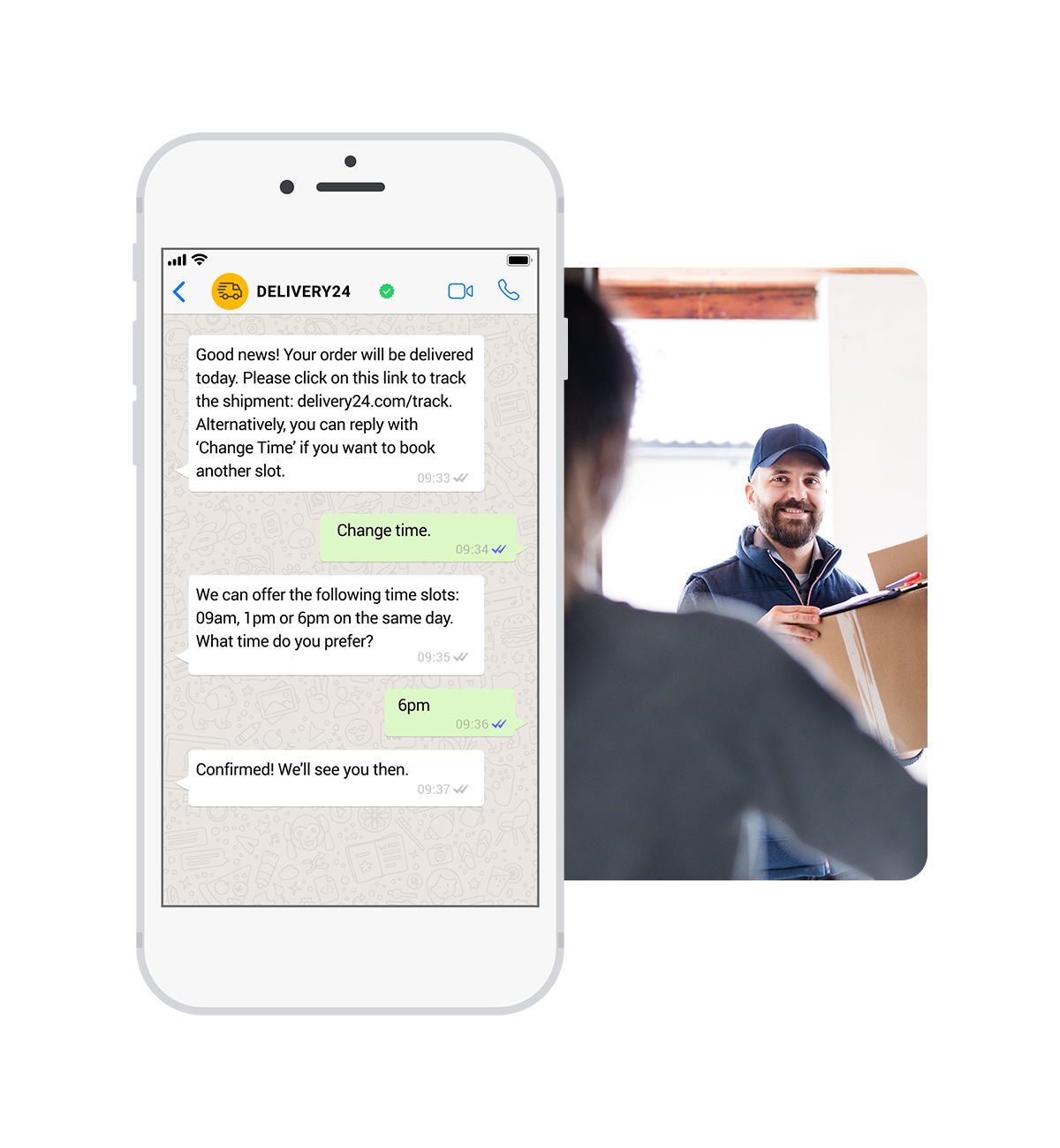WhatsApp Message Templates for Logistics, Ecommerce Fulfilment and more

The messaging platform is a potential game changer for logistics sector CX, but only if its message templates are mastered — here’s what they are and how to make sure they deliver every time.
While COVID has been devastating for many businesses, the logistics sector has experienced massive growth. For example, in the US, e-commerce sales have increased over 30% since the pandemic began — with all those orders needing delivering — while in Germany, DHL has experienced an increase from 5.3 to 9.0 million parcels a day during the same period. Don’t expect this trend to stop either once COVID does finally subside as McKinsey & Co predicts a 78% growth rate in urban last mile deliveries through 2030.
While that’s seriously good news for logistics’ bottom lines, it’s also represents something of a double-edged sword as such vast volumes must be managed successfully. And one key challenge is ensuring customers benefit from a fast, personalized, and comprehensive delivery service that covers the entire journey from order dispatch notifications through to last-mile requirements.
It’s why major global logistics and transportation solutions providers including Aramex had already turned to WhatsApp Business before the pandemic struck. No matter the market conditions, the platform has enabled them to keep their customers constantly informed via the app they use in their everyday lives.
Mastering message templates in WhatsApp Business
While overall CX strategies for WhatsApp deployment can be explored in more detail here, a key component is the use of the platform’s message templates. These are used for outbound communications to opted-in customers who want updates about their delivery and are always approved by WhatsApp team, to protect customers from being flooded with ill-defined missives (or just plain garbage) from less ‘thoughtful’ companies/spammers.
That said, ‘Message Templates’ help companies create a coherent, disciplined approach to its messaging strategy when using WhatsApp Business. Messaging can still be personalized with templates featuring numbered placeholders {{1}} — these represent the message’s variables — that can be replaced with, say, customer names, order numbers, dates, times, even special characters.
To give logistics companies a clear steer on how message templates should be phrased and deployed across the entire delivery journey, here are a few ideas on how to create message templates for the logistics sector:
Confirmations made clear
An order is placed by the customer with a WhatsApp notification sent to them to confirm details. The message template can look like this in its stock form:
Hi {{1}}. Thank you for shopping with {{2}}. Your {{3}} order is confirmed and will be shipped shortly. Please check your order status at {{4}}
Using the customer’s information from the ordering process, the message will appear to them as follows:
Hi Chelsea. Thank you for shopping with Faraday Protection. Your car key fob pouch order is confirmed and will be shipped shortly. Please check your order status at www.faradayprotect.com/order_status
Deliveries detailed precisely
Such simple but vital customization can be delivered at all stages of the process. For instance, here’s how a delivery day notification template can be written:
Good news! Your order {{1}} is out for delivery. Please click on the link to track the shipment: {{2}}
Better still, WhatsApp enables logistics to offer a service that can save time and hassle for both the customer and the company itself. For instance, on delivery day, the business can check in advance whether the customer will be in at a specified time:
 Issues resolved transparently
Issues resolved transparentlyDelivery issues happen; maybe the driver is running late due to traffic or has a mechanical issue with their vehicle. Again, WhatsApp provides the perfect platform to fire off urgent updates to manage customer expectations (and disappointments). For example:
We could not dispatch your order today due to a {{1}} issue. We apologize for the delay but have rebooked and will deliver at the same time tomorrow: {{2}}. Enter 'Change time' if you would like to change the delivery time, otherwise we will see you tomorrow.
WhatsApp Business also offers the ability for customers to reach out and make a complaint. Instead of relying on message templates in such instances, the platform can be configured to put the customer straight through to a live agent to manage the complaint.
WhatsApp Business message templates: An answer for every eventuality
Perhaps the greatest strength of message templates is their sheer versatility:
Think delivery confirmations…
Hi {{1}}. This is {{2}} from {{3}}. I just wanted to confirm that you received your package as requested? Send 'Yes' if all good. Send 'No' if there was an issue and we will get right back to you.
Think last-mile delivery details…
Hi {{1}}. Your order is due with you today. Just wanted to check if there were any special requirements. Reply with 'Yes' and one of our agents will message you to take your details for the driver.
Think feedback to improve customer services…
Hi {{1}}. Hope you are happy with your delivery. To help us make our service even better, take a moment to fill out our 10-second survey here: {{2}}
WhatsApp Business: A vital ally for making logistics CX more manageable
Such a diverse and comprehensive suite of use cases illustrates why message templates are an ideal fit for logistics companies, enabling them to wrangle customers’ many needs more efficiently and quickly. Critically, adopting WhatsApp Business itself can be a relatively simple process too.
If sourced through an official provider such as tyntec, every aspect of a rollout can be managed. From full API-driven integration with existing CRM systems and code-free chatbot deployment through to message template consultancy and approval, the implementation process is designed to fit round the company’s existing work processes, not hinder them.
Most importantly, a successful WhatsApp Business rollout ensures that logistics operations can benefit from offering greatly enhanced CX combined with more effective and cost-effective customer care services. And with the number of deliveries set to continue increasing during the pandemic and in the long-term, that can only be good news for both the logistics sector and its increasingly demanding customers.
Discover how tyntec helps logistics operations benefit with WhatsApp and more here.
Are you ready to go? Get started now.
